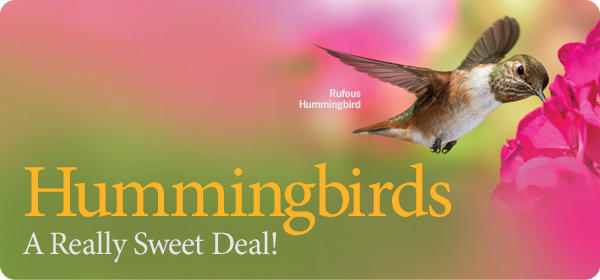
Hummingbirds - Too Good to Be True!
Hummingbirds – Where do you start? So cool! So tiny! So unique!
Certainly one of the most beautiful birds in the world and truly one of the most fascinating.
What makes them so special?
Size for one…or the lack there-of. They really are the smallest of all birds, and yet, with more than 330 species, they are the second largest family of birds in the world. A fact made even more remarkable when considering that they are found no where else on the planet except in the Americas. Not in Asia, not in Europe, not in Africa or anywhere else except the Western Hemisphere.
They are the undisputed avian aerobatic flight champions, masters at hovering and the only birds able to fly backwards and upside down.
They have the fastest heart rate, the fastest wing beat, the fastest metabolism and the largest heart, in proportion to body size, of any bird.
A large heart, but a really small brain, the smallest of any bird…about the size of a BB! But it’s a good brain, capable of navigating thousands of miles to migrate back to the exact same feeder year after year.
And the smallest of all birds has one of the biggest appetites…ingesting up to eight times their weight in solid food and liquid every day.
How much is eight times your body weight?
As for that “solid” food…they use the flexible tip of their bill to capture insects and insect eggs from the ground and on plants. They love spiders and spider eggs. And as for the “liquid” portion, their forked, open-grooved tongues lap up nectar from the feeders and flowers at an amazing 12 times a second.
So, maybe they aren’t too good to be true…but they are too good to miss!
Do you have your feeder out yet?
Hummingbird Nectar Mix:
Hummingbird nectar is a simple solution of 1 part table sugar to 4 parts water.
DO NOT ADD DYES; food coloring is unnecessary and potentially harmful to hummingbirds.
Mix until sugar is completely dissolved. Extra nectar can be stored in the fridge for up to 1 week.
How often should it be changed?
Feeders should be cleaned out and nectar replaced at least TWICE per week under mild weather conditions (temps in the 60's or 70's)
The hotter the weather becomes, the more often this must be done, sometimes even daily! Otherwise spoiled nectar left unchecked can become a dangerous health hazard to hummingbirds.

